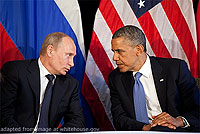U.S. foreign policy will become more uncompromising in Obama’s second term – Igor Ivanov

MOSCOW. Jan 25 (Interfax) – Igor Ivanov, Russia’s former foreign minister and former Security Council secretary, who is now president of the Russian International Affairs Council, said he expects U.S. foreign policy to be more energetic and even tough during Barack Obama’s second presidential term.
Ivanov also said John Kerry, who was nominated for the post of secretary state in the U.S., is well-known in Moscow.
The U.S. Senate recently discussed Kerry’s candidacy and the International Affairs Committee recommends that the Senate approve it before the end of this month. Kerry’s candidacy was nominated by Obama on December 21, 2012.
“As for the common approaches, foreign policy ideology, and the main priorities, we will most likely not see any radical changes. However, the second presidential term of any U.S. president is always different from the first term, including in regard of foreign policy. In the first four years in office, the president constantly has to think about re-election, which means maneuvering, reaching compromises with political opponents, and heeding public opinion,” Ivanov told Interfax.
“The second term is the last one. The president is no longer tied down and he has to show what he can do. I think Barack Obama’s foreign policy will become more active, energetic, and probably tougher in some aspects. In my recent conversation with John Kerry, he said that now is no the time for loud statements, but a time for specific actions,” he said.
“We see a considerable renewal of the Obama team. There is a new secretary of state, new pentagon chief, new director of the CIA. They all are well-known politicians with a lot of experience in international affairs, Ivanov said.
Ivanov said John Kerry is a recognized leader of the Democratic Party and ran for president in 2004. Until now he has headed the U.S. Senate International Affairs Committee and has a lot of authority both in the US. and outside.
